Reviews by Amazon
May Spotlight Pick:
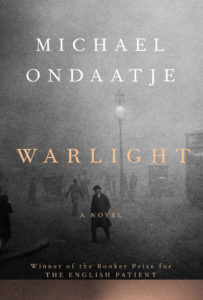 Warlight
Warlight
by Michael Ondaatje
“First sentences matter, and Michael Ondaatje’s Warlight begins with a distinctly dramatic one. “In 1945, our parents went away and left us in the care of two men who may have been criminals” says 14-year-old Nathaniel, who with his older sister Rachel finds himself living in bombed-out London with two shady characters known as “The Moth” and “The Pimlico Darter.” Warlight
starts with elements of a classic children’s adventure story, but its shadows run increasingly deep as Nathaniel, growing older, uncovers the network of deception that masks his mother’s spy-work. When the trail of factual discoveries grows cold, he imagines a past he can never truly know, composing, in effect, a dreamlike memoir of his “lost inheritance.” In Warlight
, Ondaatje, now 74 years old, has written a wonderfully varied, blazingly literary, and gut-twistingly emotional story that will leave readers grateful for whatever solidity their own families can claim, though newly aware of the fundamental mystery of other lives.” –Sarah Harrison Smith, Amazon Book Review
Featured Debut:
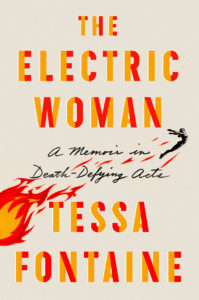 The Electric Woman: A Memoir in Death Defying Acts
The Electric Woman: A Memoir in Death Defying Acts
by Tessa Fontaine
“We all have things that we’re afraid of, from the mundane (spiders), to the profound (boasts about the size of one’s nuclear buttons). For Tessa Fontaine, her greatest fear was losing her mother, and after she suffered a series of debilitating strokes, this would imminently become a reality. Despite her precarious health, Fontaine’s mom decided to defer a dream no more and tour Italy with her husband—a courageous, if not medically ill-advised, adventure. It was also just the cue her daughter needed to cross off a bucket list item of her own: join the circus. Like any other job, a certain skill set is required, one that Fontaine (not so convincingly) espoused. But she was a quick study, and over the course of a season with the World of Wonders, the last touring sideshow in America, she learned to eat fire, charm snakes, become a human flashlight, and fit-in with her sideshow family (perhaps the biggest feat of all). Turns out, there isn’t much smoke and mirrors involved; to perform these death-defying acts, you must “un-train your instincts, unlearn self-preservation”—you have to, essentially, make peace with pain. That also happens to be one of the keys to living a full life, and the overarching message of this unique, and moving memoir: if you don’t face your fears and open yourself up to heartache, you’re closing yourself off from the best life has on offer. The Electric Woman is a fascinating behind-the-scenes peek at carnival life, and an ode to unconditional love.”
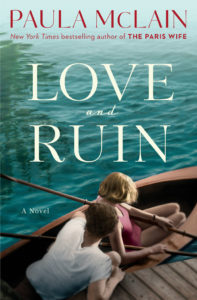 Love and Ruin
Love and Ruin
by Paula McLain
“Paula McLain said she was done writing about Ernest Hemingway after she finished her bestselling novel, The Paris Wife, but he crept back into her consciousness and six years later is Love and Ruin, an exceptional novel about Ernest Hemingway and his third wife, Martha Gellhorn. Love and Ruin
is the story of their relationship, yes, but at its heart it’s the story of a driven and fearless young woman who became a force to be reckoned with in her own right. McLain takes readers from the front lines of the Spanish Civil War to the lush refuge of Hemingway’s Cuba as Gellhorn blossoms into a venerable war correspondent, while the already famous Hemingway pens his master work, For Whom the Bell Tolls. We watch over Gellhorn’s shoulder as she grapples with the horrors of war, falls in love with a celebrated yet flawed man, and agonizes with self-doubt about her strength as a writer; yet somehow she manages to stay true to herself through it all. Love and Ruin
is a love story, the making of a trail-blazing woman, and most of all a spellbinding work of historical fiction.” –Seira Wilson, Amazon Book Review
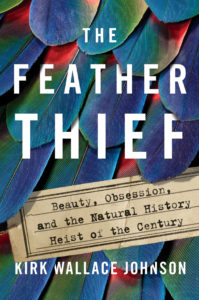 The Feather Thief: Beauty, Obsession, and the Natural History Heist of the Century
The Feather Thief: Beauty, Obsession, and the Natural History Heist of the Century
By Kirk Wallace Johnson
“The title of The Feather Thief smartly echoes Susan Orleans’ The Orchid Thief
, and The Feather Thief
has good reason to compare itself to such an admired book. Strange niches of history. Obsessives who refuse to adhere to the law. A writer who stumbles upon a story that becomes an obsession in its own right. All these elements combust to create Johnson’s investigation into the theft of 299 rare bird skins from a British natural history museum. While bird skins might sound like (ahem) dry reading, Johnson knows just how to fascinate the reader, plunging with vigor into exotic bird exploration, the crackdown on rare bird trafficking, and the insular world of fly-tying enthusiasts, all of which lead, almost inevitably, to the theft from the Tring Museum. The most likely receivers of the stolen goods? Fly-tiers with an unquenchable thirst for feathers from blue chatterers, the resplendent quetzal, and birds of paradise so they can re-create outlandish Victorian-era salmon flies. Although the thief is caught, Johnson decides to investigate himself what happened to the 106 never-recovered bird skins, pulling the reader even deeper into the thief’s bizarre world. Clever, informative, and sometimes endearingly bumbling, this mix of natural history and crime opens up new worlds. You’ll never look at a stuffed bird the same way again.” —Adrian Liang, Amazon Book Review
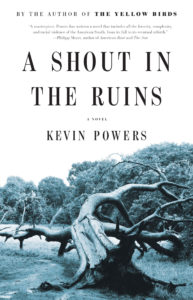 A Shout in the Ruins
A Shout in the Ruins
by Kevin Powers
“Kevin Powers’ 2012 debut The Yellow Birds was a compact novel based loosely on his experiences as a soldier in Iraq, and it put him on a short list of talented new writers to watch. In this sophomore effort, A Shout in the Ruins
, Powers has written another compact work, albeit one that introduces more characters and spans over 100 years. It opens during the Civil War, on the Beauvais Plantation outside of Richmond and examines the fates of those living on the plantation, white and black, through roughly a century. The south has a history built on violence and displacement, as does the country as a whole, and Powers is asking what that means for us, the people who have inherited that history. With its scope, themes, and careful attention to language, A Shout in the Ruins
is a highly ambitious novel. You read the book as much to get lost in the words, in the voice and richness of description, as you do for the story; and while it may not hit every mark, it succeeds in its attempt to reach farther and higher than most. ”
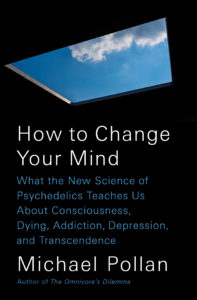 How to Change Your Mind: What the New Science of Psychedelics Teaches Us About Consciousness, Dying, Addiction, Depression, and Transcendence
How to Change Your Mind: What the New Science of Psychedelics Teaches Us About Consciousness, Dying, Addiction, Depression, and Transcendence
By Michael Pollan
“Michael Pollan, whose curiosity about our eating habits led to thoughtful, culturally transformative writing in The Omnivore’s Dilemma and, most recently, Food Rules
, here explores the potential psilocybin and other psychedelics hold for transformation of the spiritual and emotional kind. As he tells it in How to Change Your Mind
, a fascinating, sometimes moving look at the history and uses of psychoactive compounds, Pollan avoided such drugs in his youth, but later in life became intrigued by the opportunity “to become more ‘open’—especially at this age, when the grooves of mental habit have been etched so deep as to seem inescapable.” And then there was the chance of experiencing a spiritual epiphany—“touching the face of God,” as one ecstatic user put it. Pollan’s natural skepticism and wry humor is a good match for the detailed accounts he includes of mind-blowing, trip-induced revelations. Ultimately, whether such experiences lead to genuine insight into, say, the origins of the universe or what we can expect after death seems less interesting to Pollan than the hope psychedelics offer people suffering from depression, addiction, and acute illness. Can magic mushrooms be used more broadly for “the betterment of well people”? Readers who begin reading Pollan’s book feeling doubtful about the responsible use of psychedelics may find their own minds changed by his engaging, enlightened, and persuasive combination of personal and journalistic research. “I felt as if I were standing on the edge of a wide-open frontier, squinting to make out something wondrous,” he writes, and with him as our guide, so do we.” —Sarah Harrison Smith, Amazon Book Review
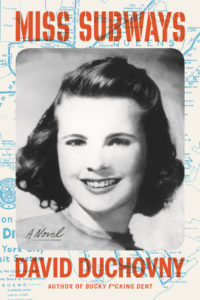 Miss Subways
Miss Subways
by David Duchovny
“In a poem by W.B. Yeats about Irish mythological figures, Emer and Cuchulain (coo-cullen), he calculates the cost of Cuchulain’s wandering eye, describing how a dalliance with another woman meant Cuchulain “lost the world and Emer for a kiss.” In David Duchovny’s Miss Subways another Emer faces a similar dilemma. Emer lives in New York City with her boyfriend Con, her writerly aspirations diverted into doing research for Con’s opus on New World pre-Christian deities and folklore, her life devoted to Con’s needs. Then Sid, a “mini-me in a monkey suit” with an Irish accent turns up on her door to tell her that Con has fallen for a fellow academic, Anansi, and that Emer must give him up to save his soul. When she protests, he asks “Where are your lady balls? You need to remember why you fell in love in the first place.” So begins a supernatural, darkly comic, downright weird quest, populated with a cast of mythical figures from every continent, for Emer to find her lady balls and take control of her destiny. Some mythical figures Emer must conquer on her way to finding her power; others appear in unexpected locales to do battle by her side. This inventive, philosophical, comic romp is a Valentine to the New York familiar to its residents (the subways, the cheap umbrellas, the doormen, the delivery guys). And although Emer may feel as though she’s in a shaggy dog story for much of the book, the reader will recognize this as a fairy tale for grown-ups, one that restores the world, and Emer. –Vannessa Cronin
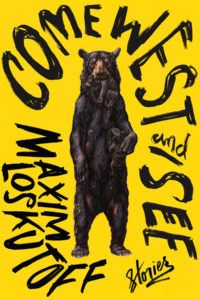 Come West and See: Stories
Come West and See: Stories
by Maxim Loskutoff
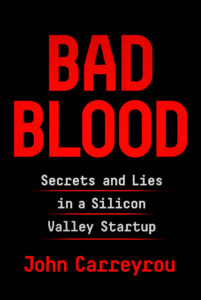 Bad Blood: Secrets and Lies in a Silicon Valley Startup
Bad Blood: Secrets and Lies in a Silicon Valley Startup
by John Carreyrou
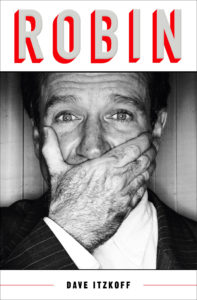 Robin
Robin
by David Itzkoff
David Itzkoff’s monument of a biography is an intimate and thorough examination of Robin Williams as both man and performer. From his years as a reclusive kid playing up in his attic bedroom, to his early days of standup, to the runaway success of Mork and Mindy, to movies, addiction, recovery, and fame, his need for affirmation was the thread that drew him forward. He sought that affirmation by working tirelessly, and Itzkoff chronicles the actor’s successes and failures, as well as his close friendships in and out of show business, to create a deep psychological portrait. Robin Williams possessed an earnestness and a craving for honesty that made him shine brighter even as it threatened to destroy him. This is a bittersweet read, with highs and lows, but the Robin Williams who emerges is as compelling as his greatest performances. — Chris Schluep


Leave a Reply